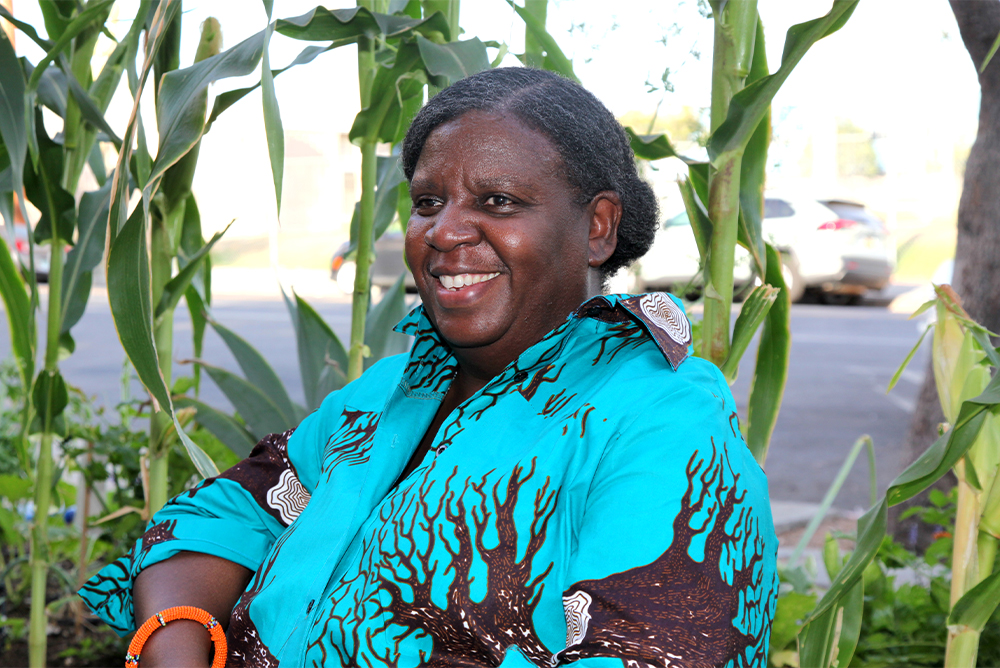
Photo by Aaron Salcido.
Janette Robinson-Flint is the executive director of Black Women for Wellness. Before sitting on a panel for the Zócalo/California Wellness Foundation event, “Can California Lead a New Reproductive Rights Movement?”— put on in partnership with Esperanza Community Housing’s multidisciplinary arts festival South Central Innervisions: An AfroLatinxFuturism—Robinson-Flint sat down in our roving green room to tell us about being a foodie, her love of salsa dancing, and what reproductive justice means.
You’ve traveled a lot. Where is one place you’ve been that you enjoyed and why?
Every place I’ve been I’ve enjoyed. The most recent place I was in was Zanzibar and Tanzania. We went on safari in a place called Arusha. I got this great shot of a lion coming right at me. I was in a jeep. I drive a Jeep, so now I call my Jeep “City Girl,” because she is nothing compared to the jeeps we used in safari.
Who is one of your sheroes?
One of my favorite sheroes is Ida B. Wells. One thing is she said you have to have a gun in your house. The world we live in is not a nonviolent world. I love the fact that she was a journalist. She was well-traveled. She was married and had a family. She started her activism because she was taking her family from one place to another and bought a train ticket and they kicked them off the train because of segregation. And she was like “uh-uh, it’s not going down like that,” and she sued the railroad and just really created a life of activism for herself.
Kitchen Divas is an initiative from Black Women for Wellness. What was the inspiration behind it?
I love being a foodie. I love great food and great conversation. There were six women who started Black Women for Wellness. Of the six, four were vegetarian and two were not. So, when you start an organization with a group of women, you end up spending a lot of time eating together. We were always trying to find that sweet spot where everyone was happy with the food. That’s what started Kitchen Divas. And now I’m ready to go international with it! In 2021 we did a Kitchen Divas in Ghana. And our program manager, Charity, is going to South Africa this year. So we’re planning to do one there. And the food in South Africa is, wow, off the chain! It’s like the world has come together for the food scene in South Africa.
Where can we find you on a typical Friday eve?
Friday? What a thought! Friday afternoon is when we have our policy conversation when our policy staff gets together. I actually had to laugh the other day because on my schedule it is half an hour. That meeting has never lasted 30 minutes only. But I enjoy the people that I work with and enjoy chitchatting with them about all the stuff in addition to policy. And at night, before the pandemic, you could find me salsa dancing. There used to be this club in North Hollywood called Mama Juana’s, on Cahuenga. We would just slide on down there, get some food, and that was Friday night.
Who is your dream dinner guest—dead or alive?
I can’t just have one! It would have to be a dinner party. I would love to see my mother and Malcom X have a conversation. See how they’d go back and forth. Of course, my dad would be there too. [They’d chat about] the politics of the day and the politics of old black men and mix in the older black women. That would just be fascinating.
If you can describe it, what does reproductive justice mean to you?
We talk about how reproductive justice is the interaction of all the things that you use to make a decision about whether or not to have a child—do you have enough money? Do you live in the right environment? How’s your job? Addressing all the systemic challenges. But then I thought about this panel—the policy people, the midwife from Kindred Space. My daughter had a baby recently and went to Kindred Spaces LA for prenatal care. They had a garden. I could just pick kale collard greens and still listen in on the visit. And I thought: This is how people should get prenatal care. And then we also have political will: Barbara Ferrer came to L.A., and said, “We’re gonna attack this issue around maternal and infant mortality from a public health perspective.” I’m with that! We have a situation where we can create a shift in change that will be meaningful. We have folks in public health, folks in elected office, we have community-based orgs, we have midwives, and pregnant women, too. For us, to move forward toward reproductive justice, it’s all of those elements coming together.



